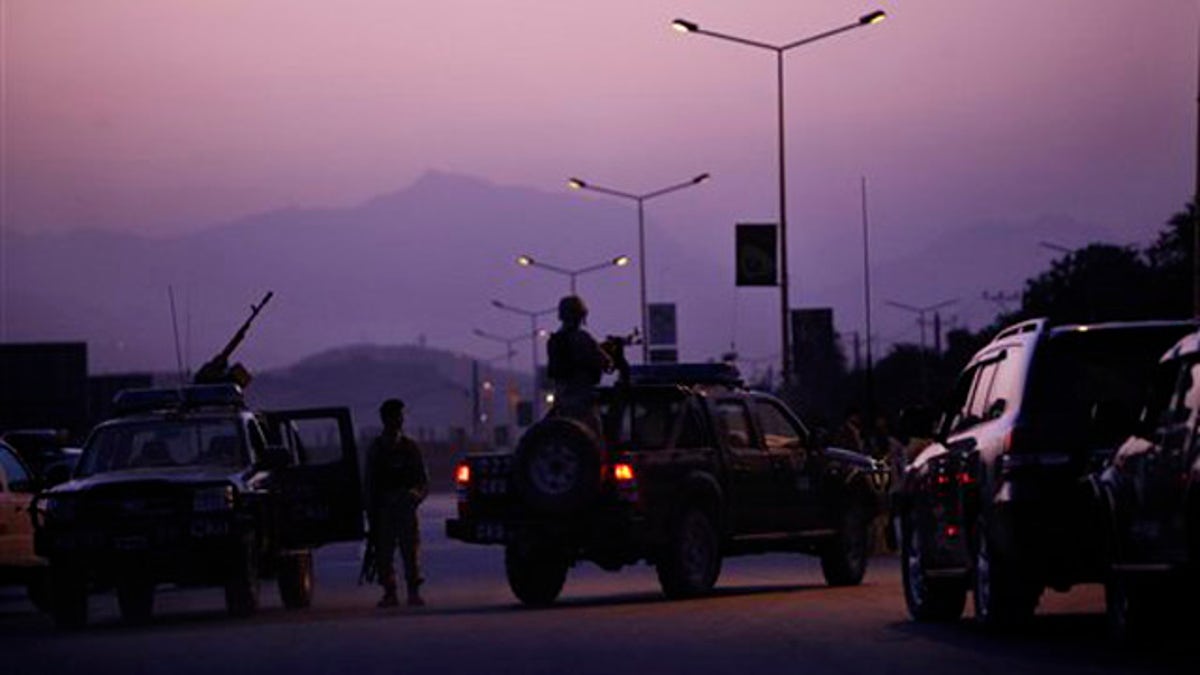
An Afghan army officer mans a heavy gun mounted to a vehicle at the entrance to the InterContinental hotel, which came under attack in Kabul, Afghanistan, June 29. (AP)
The deadly attack earlier this week on a western-style hotel in Kabul could throw into question efforts to reconcile with the Taliban, despite renewed calls by President Obama and top U.S. officials to engage the insurgent network in peace talks.
The attack Tuesday at the InterContinental Hotel left a dozen people dead, including a local judge. The U.S.-led coalition blamed the sophisticated strike on the extremist Haqqani network, "in conjunction" with the Taliban.
Western forces did not hesitate in striking back. The coalition reported Thursday that a Haqqani leader suspected of aiding the attack was killed in an airstrike. But the Obama administration increasingly is trying to couple military muscle with diplomacy as the president begins to withdraw troops from the country and move toward a transition to Afghan command.
President Obama said last week that the U.S. will "join initiatives" to "reconcile" Afghans, including the Taliban, provided they split from Al Qaeda and abandon violence.
"We have reason to believe that progress can be made," Obama said.
But while analysts see a clear upside in trying to peel away the pliable elements of the Taliban, the Kabul hotel attack contained some unsettling messages.
Lt. Col. Tony Shaffer, an Army Reserve officer who served in Afghanistan from 2003 to 2004, said the attack shows the Taliban are far from diminished. In turn, he suggested the motivation for accepting U.S. conditions for talks is not really there.
"The conditions are stupid," he said. "The Taliban don't care about conditions because they're winning."
Shaffer, who works with the Center for Advanced Defense Studies, does not oppose the idea of reconciliation talks with the Taliban. But he said the administration needs to drop the conditions, while targeting its message toward leaders in Pakistan.
"We're not getting to the people who are going to make the decisions," he said. At the same time, Shaffer said the administration needs to make the choice even clearer -- come to the table, or "we'll kill you."
To that end, he applauded the coalition for taking out the Haqqani network operative within hours of the Kabul attack.
Matthew Levitt, a senior fellow with the Washington Institute for Near East Policy who used to work on intelligence for the Treasury Department, said it's likely the Kabul attack was executed by "full-fledged Taliban" -- as opposed to rogue elements. This, coupled with the appearance that the Taliban has increased coordination with the Haqqani network, complicates U.S. efforts, he suggested.
"This is what the Taliban does and is all about," Levitt said. "It means that there are hardcore (Taliban) that can't be turned for certain."
However, Levitt said the goal of creating "fissures" in the Taliban and drawing away the non-hardcore remains a worthy one. He questioned whether negotiations could make a big difference with the Taliban, but said it appears the Obama administration understands the uncertainty of it.
He also praised recent efforts at the U.N. Security Council to distinguish between Al Qaeda and the Taliban.
"I don't think it reflects some naivete that the Taliban are really our friends and can be negotiated out of this," Levitt said.
Secretary of State Hillary Clinton clearly spelled out the United States' reconciliation policy at an event in February, when she called on Taliban members to "break ties with Al Qaeda, renounce violence and abide by the Afghan constitution" in order to rejoin society. The administration has tried to impose similar demands on Hamas, which so far has not yielded many takers.
Clinton also was quoted Thursday saying the U.S. is reaching out in Egypt to the Muslim Brotherhood -- which was officially banned under ex-President Hosni Mubarak but is looking to play a political role in a post-Mubarak country.
As with the Taliban talks, Levitt said the administration has something to gain from engaging the major parties in Egypt, but U.S. officials must enter those talks with a level head.
"While mostly non-violent, they are indeed a radical Islamist organization," he said, expressing concern that the State Department may not "be capable" of making that distinction. "It's going to be a very delicate dance."
The Simon Wiesenthal Center was more critical, releasing a statement Friday saying despite the changing political landscape, "the Brotherhood's hatred of Jews and Israel has not changed at all."












































